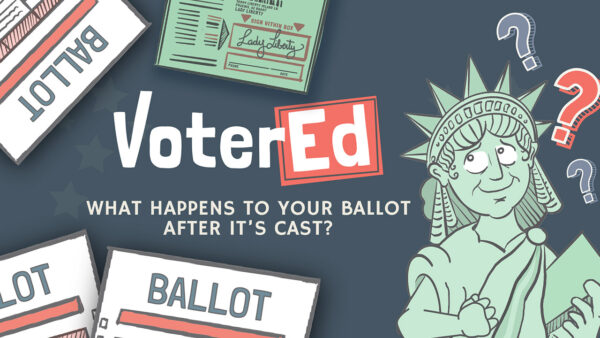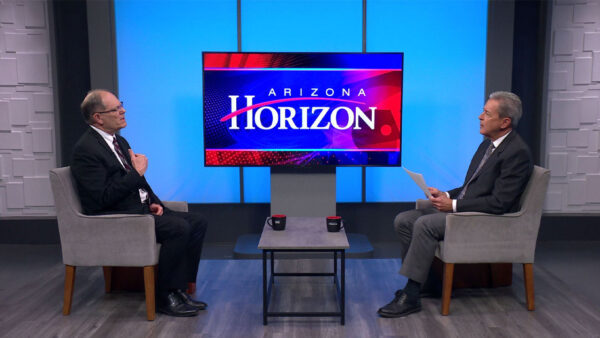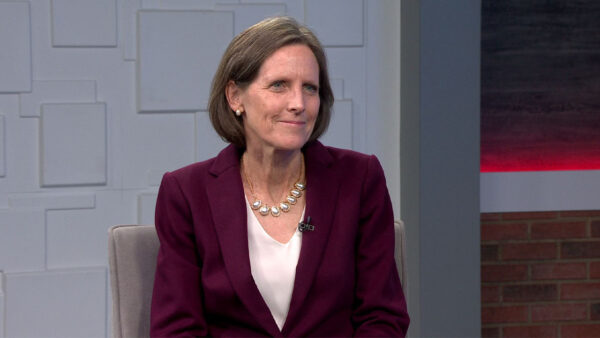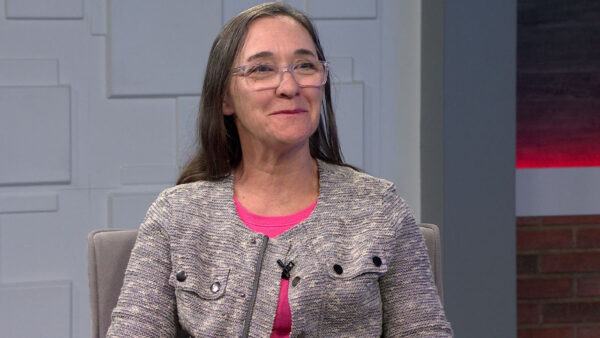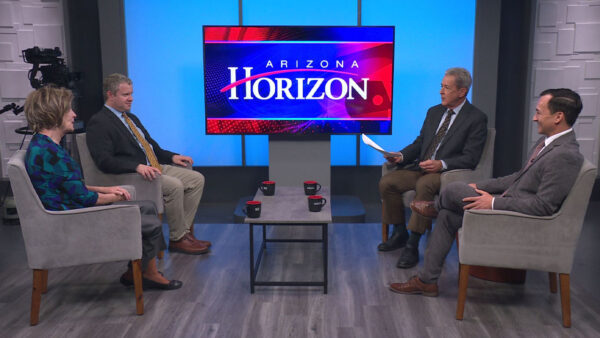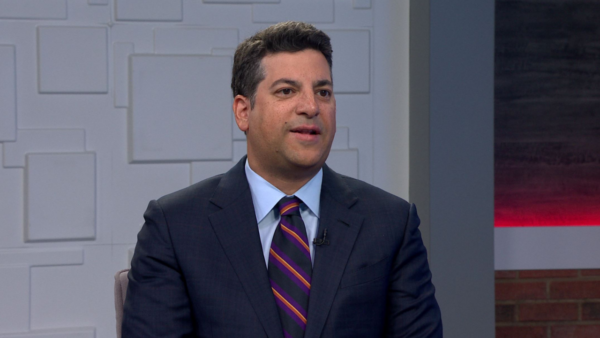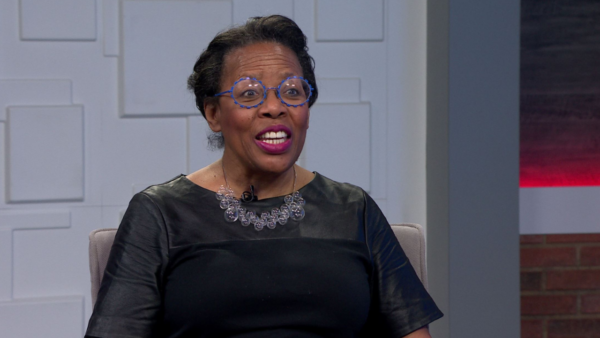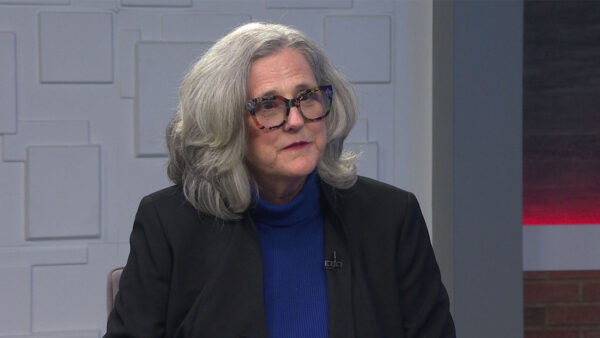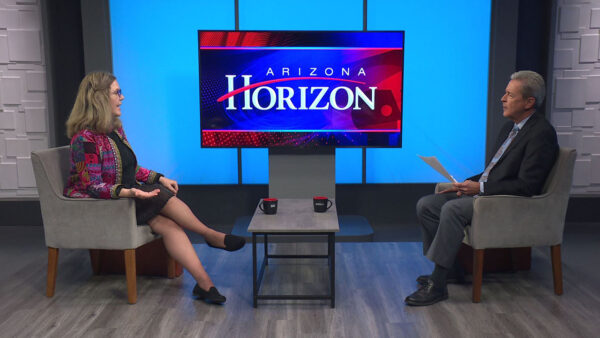Should companies that install solar panels on school grounds, and sell the power they produce to schools, be regulated as utilities? Chairman of the Arizona Corporation Commission Kris Mayes explains the Commission’s recent decision on the issue.
Ted Simons: The Arizona corporation commission says companies that provide solar service agreements should not be regulated like electric utilities. We'll hear from the commission chairman in a moment. But first, David MAJURE and photographer SCOT OLSON take us to a west valley high school that's close to switching on its solar power.
David Majure: Verrado High, One of four schools in the west valley Agua Fria Union school district. It was built to be energy efficient. Earning a LEED silver rating from the U.S. Green Building Counsel. Their monthly utility bills are roughly $10,000 to $20,000 less than other comparable schools in the district and now it's ready to cut those costs more.
Dennis Runyan: As a district, we've been excited to work in the solar area.
David Majure: Over 1400 photovoltaic solar panels cover their rooftops
Freddie Bracamonte: These panels are going to provide 30% of the energy requirements for this particular location which is Verrado High School.
David Majure: but the solar panels don't belong to the school or the district.
Freddie Bracamonte: Sundial Arizona Our financing entity owns them and we'll be selling the energy generated to the district.
David Majure: It's called a solar service agreement. A private company, in this case, Clean Energy Constructers buys and installs , maintains, and then operates the panels and then the district pays a fixed cost per kilowatt hour produced. It's a way for cash-strapped schools to get into solar energy.
Freddie Bracamonte: The district can't capitalize, so that's why they lean on a company like us to make solar a viable solution to their dilemma.
David Majure: The company covers the cost of the $5 million solar project and gets back almost $4 million by taking advantage of incentives offered by APS and the federal government.
Freddie Bracamonte: With the tough economy It's very hard for a school district to issue a bond to purchase capital equipment. So a company like ours, we'll purchase it and claim the tax credits and utility incentives and provide the district with a fixed price per kilowatt for energy for 25 years. So it's a long term hedge, It's a hedge against utility increases.
Dennis Runyan: As you know, costs can be volatile. Take some of that equation out of this and it allows us to maintain our budget over the next 25 years in a way we can manage.
David Majure: The agreement is expected to save the district about $2 million over the life of the contract.
Ted Simons: Both the Arizona corporation commission staff and an administrative law judge say companies that provide solar service agreements should be classified as public service corporations and regulated like utilities. But the commission decided against such regulation. Here to explain the decision is commission chairman, Kristin Mayes. Good to see you.
Kristin Mayes: It's great to be here.
Ted Simons: The idea that you sell electricity. You're a public service corporation, you need to be regulated. You say not so fast?
Kristin Mayes: We decided to overturn that recommended opinion and order recently because we decided that under the law, under the constitution, projects like the one that you just saw, just don't meet the definition of what a public service corporation is and the issue that we had, and it was kind of a close call, because the issue we have in Arizona, we have this wonderful constitution, that very specifically defines what a public service corporation is. And it says any entity that furnishes electricity or water or fuel to another entity is a public service corporation. And the question became are these SS As, these companies that provide SSAs as explained in the clip, furnishing power to another entity, the schools, under the constitution, and under the law, do they really look like big -- you know, utilities or utilities that ought to be regulated. And we decided no on both counts basically. We decided they shouldn't.
Ted Simons: Because -- what? -- this is a financial tool. Something along those lines.
Kristin Mayes: In terms of the first part of that test, we decided, look, the primary purpose of these SSAs is not to furnish the power; it's to provide a service to the schools. You heard only 30% of the power to the schools is provided by the solar panels. That's great, that's a beautiful thing we just saw there. But the primary purpose of the SSA is to act as a financing mechanism and get the solar panels on top of the schools, and schools, cities and non-profits are different, because unlike for-profit businesses, they can't take the tax credit now and that's a big deal. Because they can't take those tax credits now, they have to rely on these other companies to do it for them.
Ted Simons: So If, then, the case that got your attention, the commission's attention with the solar city, and if solar city or the company we saw in the clip there, if they were not involved in these SSAs, these solar service agreements, would they then be regulated?
Kristin Mayes: Probably not. The answer is no, because a lot of these same companies provide or sell solar systems to -- to for-profit entities, to residential customers and when you do that, you don't have the situation where you're potentially furnishing the power to another entity. You're just selling the system. Let's say, Ted, you decided you wanted solar panels on your rooftop or the school your kids go wanted to do it, and they purchase the system, they're just providing power to themselves and that's where the tricky legal issue came in. When you have somebody else doing it, for a school, does that fall under the constitutional definition of a utility? And we did leave the door open. You know, there were folks who said, you know, you should be regulating this, commission. We did leave the door open for down the road, potentially regulating these companies, like solar city, if they become like utilities. If they become so popular that everyone is doing it and take on the characteristics of utilities we're going to potentially leave the door open to regulate them down the road.
Ted Simons: So because a solar city or other companies that involve these SSAs, because they design, install, maintain and finance this solar equipment and also supply the solar power, as long as there's an "also" there, that kind of falls into the --
Kristin Mayes: As long as they are providing -- primarily providing a service to the schools and as long as they don't take on monopoly characteristics and don't declare themselves to be utilities and as long as they don't take on other characteristics of utility, they will likely not be public service corporations and that's important for a lot of reasons. I mean, a lot of states have declared these type of arrangements are not public service corporations and so in many ways we're competing with a lot of other states that are inviting these companies in to do business.
Ted Simons: I was going to ask how much that comes into play, the idea that if you went along with staff's recommendation and the administrative law judge, if you would lose a lot of these companies.
Kristin Mayes: I think we decided the case on the law and the merits of the case and we were careful to narrowly craft this decision, to schools, non-profits and governmental entities and we wanted to make sure we had really done this in an air-tight way, in a way based on the fact, but sure, I mean, there's concern on the part of commissioners - and a lot of other folks that we want schools to do this. That was a wonderful thing to see that school doing such an enormous solar system on their rooftop. And I hope this -- this decision will inspire, you know, entire generations of kids to believe in the power of renewable energy and we're hearing anecdotal evidence that schools are moving forward with these projects.
Ted Simons: Were you surprised by staff's recommendation and what the judge had to say?
Kristin Mayes: Not terribly. You have to understand that, you know, there's a strong view toward regulation. You know, and we -- we're good regulators at the commission we're tough on the utilities that we do regulate, you know it was a close call and we have a special constitution in the state of Arizona and 100 years ago, I doubt they were thinking about solar panels on schools but 100 years ago they were specific about what a utility is.
Ted Simons: Thanks for joining us.
Kristin Mayes: Thanks, Ted.
Kristin Mayes:Chairman of the Arizona Corporation Commission;


